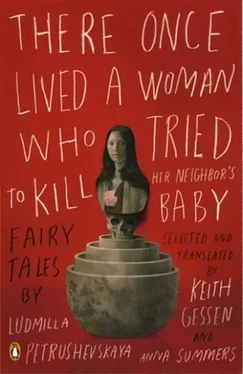This man, the father, was no longer young, and the mother also was no longer very young. They’d met when neither of them was very young, and gave birth, miraculously, to this joy, this angel, whose peers, the parents believed, didn’t appreciate him, as a tribe never appreciates its first prophet.
The father already had a daughter-his elderly daughter, as he liked to say, which was true, actually. She was the product of an early marriage, and what’s more the girl’s mother was older than the father by eleven years. Their marriage collapsed when he was forty-two and she fifty-three-how do you like that? A desperate age for husband and wife both. And then suddenly the husband met the love of his life. She too was not young, but was full of tenderness, with a cloud of hair around her golden head and blue eyes-she had just joined his firm. Everything was settled for them, and then they gave birth to this miracle, a fragile, golden-haired angel of a son. They lived together for eighteen years and a smidgeon, clinging to each other, living what seemed like an extra, bonus life, but always worrying about their little boy.
And finally the payment had come due-the tears and threats of the first wife, her curse had come to pass: may everything that you put me through return to you in spades.
***
The father has missed the plane. Nor are there any seats on the morning flight.
He gets a partial refund for his plane ticket and hurls himself into the late bus, which takes him to the train station, where he somehow manages, tearfully, to say something to the conductor, a few simple words about his son, so that she steps aside and allows him on the train-which is already moving-and even, after hearing his few simple words, puts him into her own compartment, which is overheated, and where, on the top bunk, the father lies in torment until the morning. As soon as the train arrives he races to the apartment, but it is already empty: things are scattered on the floor; the phone is off the hook, beeping; his son’s unmade bed gapes like the bed of a condemned man on the day of his execution.
The father quickly finds his bearings, learns the address of the draft board from a neighbor in the next entryway, where his son’s classmate lives-the boy was in fact his son’s tormentor, but who cares about that now. That boy’s grandmother tells the father where to run; her own family has gone to see off their child after a night of partying.
The father makes it in time. He sees his son a crowd of pale, hungover, moronic, defeated boys.
The father takes hold of his son’s sleeve, begins to scream, and wakes up in the United States, in the form of an unhappy immigrant named Grisha, who’s been abandoned by his hardworking wife six months after they arrived in the States. She went to work as a cleaning lady at the mall and then married a professor, an old childhood friend, whom she’d accidentally met there. A happy coincidence! And she cast Grisha away like an old rag.
At the moment we’re describing, Grisha has just been released from the mental hospital, where, not knowing the language, he’d spent all his time in front of the television, though without participating in the vicious arguments about which channel to put on. He’d landed in the mental ward after his third unsuccessful suicide attempt.
Somehow or other, one day he began to talk in an impoverished television language with a crazy black man, who was always yelling-nonstop-about how he was going to kill all the white people, that filth, how he’d killed ten of them already and he wanted to kill an eleventh, he was willing to go to the electric chair for it, to become a martyr for his beliefs. He was the first one Grisha understood, and he answered him in his own way, in the voice of a television anchorman. Kill me, said Grisha. Go ahead, pleeze-strangle me, if you’d like, or some other way, I don’t care, said Grisha, utterly surprised by his ability to form English words, and unaware that the soul of that unhappy father was already knocking about inside him and that it knew many things (including five languages). The weeping Grisha was taken to his room and tranquilized.
The black man, Jim, was stopped short, knocked from his imaginary universe of righteous racial vengeance by this actual white person who was asking for his own death. Jim began wondering whether he could do it-commit this act for, he claimed to himself, the eleventh time, and immediately he went to find out what had happened to this piece of filth, who had turned out in fact to be a dirty Russian, which on the table of ranks in Jim’s head placed him below just about everyone. Jim was, after all, a full-fledged citizen of the United States.
And he began to defend the rights of this dirty Russian. He taught him to recognize the main enemies of democracy on television-the senators and presidents and newspeople who spread their lies. Jim taught Grisha a great many things, nodding his wise old head and spinning his thin fingers, and Grisha just kept crying.
He didn’t know he was crying for his wife and son, whom he’d left that day in the Moscow street outside the draft board, weeping on their knees next to his body. He didn’t know that the boy hadn’t been taken into the army after all, that his wife had managed to hide him even while herself wailing terribly. That is to say she wept loudly next to the body of her collapsed husband but in the meantime whispered to the boy, “Hide out at your Aunt Valya’s in the country,” and off he’d gone even before the ambulance arrived.
Grisha wandered around, weeping, unable to reach himself. He discovered a little hole below his neck, like an extra eye, from which tears poured out. He saw strange dreams-in which a cloudless joy and love surrounded him, sang lullabies to him, calmed him.
The shots they gave him made him dizzy, high, and caused him to stop crying, but the little eye below his neck kept pouring out tears.
With time the shock subsided, and Grisha was released while Jim was transferred to another building, where he found himself a protégé in the form of a little black-and-white kitten, from whom he never parted, as it too was a member of an oppressed race- America had no room in its heart for a homeless kitten. But he’d come from somewhere, and Jim had found him, and when visiting Grisha to say good-bye he showed him the little treasure in his hands.
And Grisha eventually returned to his cave. He rented a basement room from a Russian woman-it had a toilet but no bath.
***
Not long after his release from the hospital, Grisha’s landlady had a visitor-her cousin, a sad-looking gray-haired widow with a son back in Moscow. Grisha caught just a glimpse of her while going down to his basement; she was sitting on the porch drinking tea. She was stirring and stirring the tea with a spoon, and a speck of reflected light danced upon her face. Her face was tearful, dead.
The woman stirred the spoon in her tea listlessly, and the little point of light bouncing off the surface of the tea blinked on her little red nose and in her blue eye. The blue eye especially was lit up in a very poetic way-it flashed like some living precious jewel.
It was a genuine double recognition: two souls met and didn’t know it.
Five minutes later, Grisha was up the stairs and sitting across from this old woman, this widow. His landlady, her cousin, had gone off to the college where she taught. This old woman never did get around to drinking any of her tea or lifting her gaze. Grisha fell in love with her with all his broken heart, married her, and came to Moscow to meet her melancholy, pale, blond and curly-haired son.
When he shook hands with this son, this Alyosha, a tear rolled from the third, unseen eye below Grisha’s neck-a bitter, tiny tear from the dead father. Alyosha avoided the draft in the end: his father had died, as Grisha’s new wife explained it, and so the son became the lone provider for a pensioner (his mother), and by law such a person is exempt from army service. At the draft board that day they kept yelling and insisting that he should start serving now, they’d release him later (they needed to fill a quota, apparently, and without him they’d be one short). So the mother had to run around and gather the necessary papers while Alyosha was hiding-the police would come to the apartment at night looking for him-and meanwhile the funeral had to be arranged! Grisha listened to all these tales and wept every time, no matter how often he heard them.
Читать дальше












